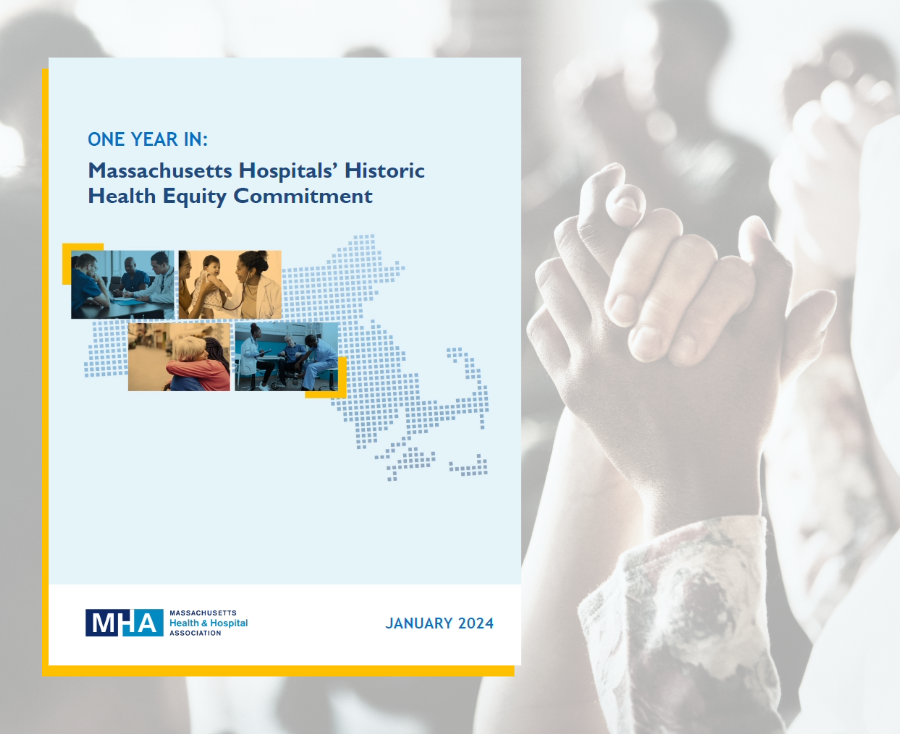ONE YEAR IN: Massachusetts Hospitals’ Historic Health Equity Commitment

Massachusetts hospitals are in the midst of a nation-leading commitment to make healthcare more equitable. Through a historic 1115 Medicaid Waiver, they have come together with the state to embed health equity efforts at the point of care, make services more accessible for patients, and reduce persistent disparities.
This report outlines the commitment’s extensive health equity goals, accountability measures, and funding structure. It also highlights hospitals’ year-one progress and previews what will be accomplished over the course of the five-year journey.

The approach centers on several priorities: comprehensive data collection to better identify care disparities, screening for the supports patients may need in their everyday life, improving access for patients with disability and/or translation needs, and building new partnerships across the care continuum. It also is driven by results: hospitals can only access funding once they satisfy the commitment’s rigorous goals.
View the Report:
More specifically, hospitals and MassHealth are collecting data on patients’ race and ethnicity, along with information about their language, disability status, sexual orientation, and gender identity. Hospitals must also demonstrate meaningful improvement on rates of screenings for patients’ health-related social needs (such as nutrition, housing, and transportation needs) throughout the five-year journey. Hospitals will be assessed on their performance and demonstrated improvements on access and quality metrics, including reductions in health outcome disparities. And they will also be establishing clinical partnerships with accountable care organizations and clinical partners, with a specific focus on improving care quality and reducing disparities.
“This is a generational effort to improve the lives of patients – particularly those who have been historically marginalized from the healthcare system. Our hospitals, health systems, and state government are holding themselves accountable for closing disparities and embracing the massive changes it will take to provide everyone with the care they deserve. It would not be possible without the leadership of EOHHS and state officials. We thank our partners at the state for bringing this commitment to life and working closely with healthcare providers every step of the way.” “
– MHA President & CEO Steve Walsh
Massachusetts hospitals are contributing a total of $875 million over the five-year commitment to help finance a new Quality and Equity Initiative Program (HQEIP). With a match from the federal government, a total of $2.2 billion in health equity incentive funding will be available for acute care hospitals to earn over the course of the waiver. The commitment is unique in that 100% of the funding must be earned based on performance of identified metrics with no direct funding available simply for implementation. In addition to the funding that is available at the statewide level, each hospital’s share of the available funding will be dictated by their individual performance on key quality and equity measures. Hospitals will be evaluated both on meeting certain performance benchmarks as well as their improvement from the previous year.
“Following this five-year process, Massachusetts will know more about the state’s health equity needs than ever before,” the MHA report states. “Most importantly, its providers will have achieved the goal of reducing disparities through culturally competent care. Taken together, the measures within this commitment will fundamentally change and improve interactions between providers and patients at the point of care. They will make sophisticated equity efforts a universal, expected part of the healthcare experience.”
The first year of the waiver program, 2023, saw the beginnings of the foundational work to implement and evaluate hospitals’ new health equity efforts. Throughout the past year, hospitals completed numerous elements of the commitment, including the completion of a detailed assessments of how they currently collect patient demographic information and establishing a process to share data with the Center for Health Information and Analysis; preparing a plan for screening MassHealth patients for health-related social needs in inpatient acute settings using a standardized tool; forming a total of 57 “joint accountability partnerships” with ACOs; and creating a health equity strategic plan that details hospitals’ health equity goals and their process for assessing the needs of their community. Each succeeding year of the waiver brings more measurable responsibilities with strict oversight from the state.
In 2023, The Joint Commission incorporated six new health equity elements as part of its triennial accreditation reviews. As part of the waiver program, all Massachusetts acute care hospitals were evaluated for adherence to the TJC health equity guidelines whether or not they were up for their triennial accreditation. All were found to be in compliance, making Massachusetts the first state in the nation to achieve the TJC health equity standards. Beginning this year, hospitals are preparing to meet TJC’s health equity certification standards – a more advanced level of expectations.

 Massachusetts Health & Hospital Association
Massachusetts Health & Hospital Association